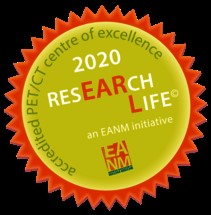Nuclear Medicine

- Clinical and scientific focus on Oncology, Neurology, Cardiology and Endocrinology
- In-house development and production of innovative radiopharmaceuticals
- Innovative radionuclide therapies (e.g., prostate, neuroendocrine and liver tumors and metastases)
The Department of Nuclear Medicine uses radiopharmaceuticals for diagnostics and treatment of various diseases with particular emphasis on endocrine, cancerous, neurological and cardiovascular diseases. While diagnostic procedures can be performed on an out-patient basis, most treatments with radioactive substances are done on an in-patient basis to achieve optimal results and to comply with German radiation protection law.
Our therapeutic facility is named after George von Hevesy, a Hungarian pioneer of Nuclear Medicine and Noble Prize winner, who worked as Professor for Physical Chemistry at the University of Freiburg.

Diagnostic & Treatment Services
- Specialized clinic for benign and malignant thyroid diseases, offering the full spectrum of modern diagnostic and therapeutic options
- Scintigraphy, SPECT and SPECT/CT for diseases of the thyroid, skeleton, myocardium, lungs, kidneys and brain. Visualization of lymphatic drainage for sentinel lymph node resection. Support of radioguided surgery
state-of-the-art PET/CT technology (e.g., full-digital and time-of-flight PET imaging) with numerous molecular imaging probes for:
- Oncology: Detection, staging and treatment monitoring of cancer, in particular lung cancer, lymphoma, gastrointestinal malignancies, prostate cancer, melanoma, neuroendocrine and brain tumors. Molecular imaging targets include glucose metabolism, amino acid transport, Prostate-Specific Membrane Antigen (PSMA), hormone synthesis and receptors, hypoxia, etc. PET-based radiation treatment planning, especially for stereotactic and intensity modulated radiotherapy.
- Neurology: State-of-the-art diagnostics, differential diagnostics and follow-up of neurodegenerative disorders, most notably mild cognitive impairment (MCI), dementia (e.g., Alzheimer’s disease) and movement disorders (e.g., Parkinson’s disease). Localization of epileptogenic foci in patients with seizures. Molecular imaging targets include glucose metabolism, perfusion, a variety of neurotransmitter receptors and transporters (e.g., dopaminergic) and neuropathology imaging (amyloid-beta and tau).
- Cardiology: Diagnosis, follow-up and prognostication of coronary heart disease. Diagnosis of cardiac sarcoidosis and amyloidosis. Detection of viable myocardium prior to revascularization. Diagnosis of acute and chronic lung embolism; presurgical assessment of lung function.
- Molecular Therapy
- Radioiodine therapy (RIT) of hyperthyroidism and goiter
- RIT and targeted therapies in thyroid cancer
- Peptide-Receptor Radionuclide Therapy (PRRT) of neuroendocrine tumors with somatostatin receptor ligands
- PSMA-targeting radioligand therapy (RLT) in prostate cancer
- Treatment of liver tumors and metastases with Selective Internal Radiation Therapy (SIRT)
- Radionuclide therapy of symptomatic bone metastases (e.g., 223Radium and other ligands)
- Second Opinion Service
Statistics
- more than 14,000 diagnostic examinations (including >4000 PET/CT scans) and about 700 radionuclide treatments per year


